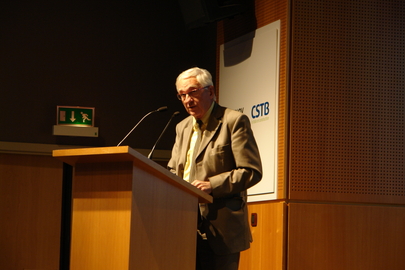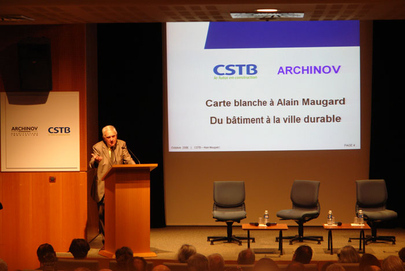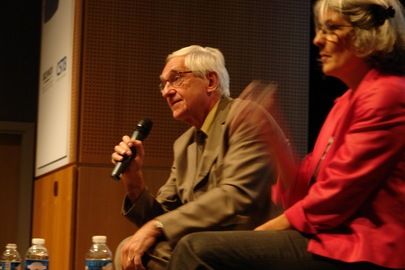Carte blanche to Alain Maugard: from building to sustainable towns
A high risk situation

"Although HQE® buildings and ecodistricts are absolutely inescapable in terms of sustainable development, we still need to change gear and approach the next plateau, namely sustainable towns." This sets the tone, and then he goes on to say "For decades, we have been spectators to a major trend, which is the build up in the economic power of megalopolises. Although concerns related to their economic growth and the social well-being of persons living in them are still important, the principal new concern nowadays is the amplitude of the environmental problem created by the towns themselves. The abundant supply of energy that fuelled the major economic boom of the last two centuries is a thing of the past. We now need to place the emphasis on control of energy demand, which also implies the development of another essential concept which is "energy efficiency".
At the moment, energy consumption is organised around two types of demand: firstly the demand necessary for the production and transport of industrial and agricultural goods, and secondly the demand related to urban civilisation. "This second point includes needs related to buildings and transport necessary for the town to function, and needs related to the life style in towns (tourism, etc.), continues Alain Maugard. It accounts for about two thirds of total energy consumption and an equivalent proportion of emission of greenhouse effect gases. Considering the predicted growth in the world population, we have a real problem to manage!"
The number of city-dwellers is expected to increase from 3.3 to 5 billions by 2030, "absorbing" almost the entire demographic growth of the planet. Up to now, the energy equivalent of three earths would have been necessary if all towns functioned according to European model, compared with only half an earth in 1960. This ecological footprint of urban civilisation has been degrading continuously during recent decades. The ecological footprint of France alone increased from 1 to 1.8 between 1980 and 2008.
![]() Display this part of Alain Maugard's speech (about 10 minutes)
Display this part of Alain Maugard's speech (about 10 minutes)
The different parameters of the problem

The problem of the ecological footprint of towns can be considered under three complementary angles, namely urban morphology, management of the city and lifestyles. "In Europe, a distinction is made between four types of towns depending on their history (Middle Ages, Baroque, Victorian or Modern) says Alain Maugard. All except Modern towns are compatible with the concept of sustainable development, and it is vitally important to recreate "microcentres" (local shops, etc.) in our modern towns to reduce energy costs due to transport. The work to be done on the morphology of towns will also need to take account of other parameters such as the place of nature in the heart of built-up areas and the density, form and urban spread of these built-up areas."
Towns cannot be managed without optimising their metabolism. Handling of "inputs" (air, energy, materials, etc.) and their transformation, and the treatment of "outputs" (waste, recycled products, etc.) offer means of reducing the ecological footprint of built-up areas. "We have many action means for reducing this ecological footprint, emphasizes Alain Maugard. This varies from arbitration on transport in town centres to providing facilities for the handicapped, and includes bio-diversity, the recreation of neighbourhood shops, creation of the shortest possible food distribution circuits, and setting up common services (laundry, etc.) for building occupants. We need to return to a pleasant density, making towns as attractive as they were in their better times".
Changing lifestyles in towns is a major challenge in reducing their ecological footprint. "If we try and define it, the concept of a sustainable town is meaningless, says Alain Maugard. We really need to talk about sustainable lifestyles. Thus, in terms of individual transport, it is quite possible to benefit from the service without owning the property. The Velib (short term for bicycle hire) in Paris is a perfect illustration of this concept. We all agree with the concept of mobility as a factor of freedom! But does this freedom give us the right to use any transport means we wish? That is not so obvious! City dweller life styles should enable people to have an ecoresponsible individual behaviour. We need to increase the number of these margins of freedom, for example by choosing between a tomato that has travelled 4 000 km and another that has only travelled 4 km. And since the town no longer shares anything collectively, the struggle to protect the environment represents a key element in cementing life in common. This concerns the social dimension of sustainable development".
![]() Display this part of Alain Maugard's speech (about 19 minutes)
Display this part of Alain Maugard's speech (about 19 minutes)
What action?

The creation of ecodistricts is probably the first step towards changing the method of managing towns as it exists at the present time. Creating groups of such districts will lead to eco-cities that will emphasize the « obsolescent » nature of modern towns. Thus, solutions such as cogeneration, heat network, etc., that could not be considered on isolated buildings, could be applied. These ecodistricts are genuine "new concept nurseries", like HQE® buildings and positive energy buildings (BEPOS) were on their own scale. "It is essential that a single authority should take control over management of towns for everything affecting housing, transport, town planning, water and even energy, even if decentralisation as it is currently imagined has to be remodelled, emphasizes Alain Maugard. Citizen participation could then be organised, because all these lifestyle choices will have to be discussed and shared with inhabitants before they can be implemented. We need to set up a dialogue with citizens in order to determine their real problems and what they want. Finally, it will be essential to create a "town metrology", in other words to acquire instruments for measuring its ecological footprint, as is already done for air pollution." These actions may be financed in many ways: added values of land for the benefit of communes following improvements to buildings and public transport infrastructures, carbon taxes, urban tolls and energy saving certificates. There is no shortage of solutions!
![]() Display this part of Alain Maugard's speech (about 8 minutes)
Display this part of Alain Maugard's speech (about 8 minutes)
Our chances of success

At the present time, the richest 20% of the population generates 80% of the ecological footprint. It is urgent that this should change. Developed countries need to accept this concept of urban civilisation to show an example to the rest of the planet. In this context, the European model has a good opportunity because although its ecological footprint now represents the equivalent of three planets, it will not be as hard to "correct" as the American model that represents five! In a way, this would be an unsurprising conclusion in that Europe (Eastern and Western), alongside China, played a dominant part in the civilisation of towns.
In terms of energy management, solutions have been found for cold and temperate climates although (paradoxically) this is not the case for hot climates. "It is incomprehensible that we cannot convert energy contained in photons into cooling at reasonable prices, despairs Alain Maugard. This is one of the most important research problems at the moment and is a genuine challenge to be faced. We need to find solutions for hot countries and quickly! I am sure that technology will help. I remain optimistic. But let us not wait until we have our backs to the wall. Consider the example of vehicles. There are means of making them clean, which in no way stops us from achieving our ambition to do everything we can to reduce their use by limiting transport - quite the contrary."
![]() Display this part of Alain Maugard's speech (about 4 minutes)
Display this part of Alain Maugard's speech (about 4 minutes)
Conclusions
There is no doubt that urban civilisation should continue. We need to persist with our modern towns, but above all, we need to correct the danger caused by its excessive ecological footprint. "We need to acquire another vision to approach problems related to biodiversity, and man, says Alain Maugard. I maintain that the entire challenge is to determine how we will get the spiral of change started, and the way in which we will control this evolution rather than suffering from it. We need to think about this new urban civilisation so that we can do it right, and make it attractive and desirable. If we want to get the best out of this transformation of urban civilisation, we need to enjoy it. Beauty has a place of honour in this model!"
![]() Display this part of Alain Maugard's speech (about 2 minutes)
Display this part of Alain Maugard's speech (about 2 minutes)
Weak signals that become strong
A number of indexes show that the mentality of city dwellers is changing. Pedestrian areas were previously rejected, but now they are in demand; the same is true of "30 kph zones". Parking spaces for the handicapped are respected, Vélib bicycles are very successful and garden centres are flourishing in the centre of towns. Why not go one step further and consider dynamic street management at different times of the day, the week, the year, etc., quieter traffic lanes that must be used after 10 pm, sharing roads with "roller skates", music festivals, etc.
